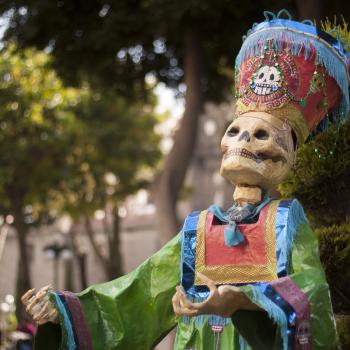The guiding principle of Darwinism is the survival of the fittest, and there’s no argument here that this can be seen within the natural order. As this is so, I have yet to understand how atheists argue that morality is also part of the evolutionary process.
I believe the argument goes something like this: “Human beings, like other primates, are communal animals. We observe communal ‘caring and compassionate’ behavior among groups of gorillas and chimps. This communal, caring behavior has developed as a way for the whole group to survive and the successful survival of the group assures the survival of both the individuals and the species. Human morality is simply a more highly developed form of this basic communal and caring behavior.”
This sounds very plausible, but on examination it doesn’t hold up because basic communal compassion and nurturing is of a completely different order than the demands of morality. A mother nurtures her young. A dominant male protects the mother and child. A group of dominant males may protect the tribe or herd. A group of elephants seem to mourn their dead. A dog stands guard next to his master’s grave. A chimp shares his grape with another chimp who has been given celery out of kindness and a sense of fair play. We can multiply the examples of seemingly noble and ‘moral’ behavior and emotions among animals, and we can acknowledge these instincts within the animal kingdom.
Do these realities invalidate the idea of Natural Law? The atheist would say they do–that this ‘moral’ behavior is simply part of the way things are. Allow me to stand this on it’s head and point out that the existence of ‘morality’ within animals is further proof that the principle of Natural Law is even more ‘natural’ than we once thought. In less developed forms it exists within the animals as well. That is to say, it is written not only in human hearts, but into the whole warp and woof of nature itself.
We may conclude, “Well, there it is…it is simply part of the way the world works. No need to call in a Creator.” Really? Here we are faced with a strange contradiction. We say that nature is red in tooth and claw and the basic rule is the survival of the fittest, and yet there is this strange tendency–even among the animals towards ‘morality’ of some sort. Why on earth would a herd of elephants mourn their dead? Why would a chimp evidence fair play and sharing? Why would a dog grieve the loss of his master? Why should a dominant male protect his female and his young? The ‘rules’ of nature and the survival of the fittest would demand that the dominant male kills and eats his young, the dog eat the body of the dead master, the elephants walk on–oblivious to the death of one of their members and the dominant chimp should steal the grapes from the loser.
It seems clear that there is some higher rule, some more noble instinct–even among the animals–that develops into what we call morality. This higher principle is one of self sacrifice, and because this contradicts the survival instinct it cannot be explained by the survival instinct.











